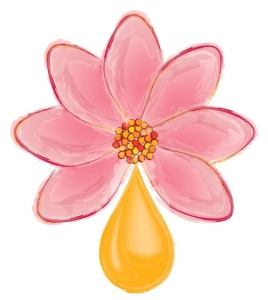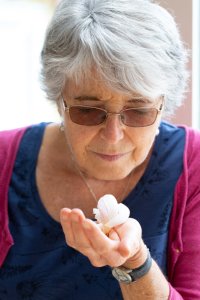Anosmia, when you lose your sense of smell completely, is a possible symptom of the Coronavirus disease, (Covid-19).
Although there are many reasons one may lose their sense of smell, it is more prevalent at the moment because of the Coronavirus which is why I wanted to write about it and bring some awareness to what happens when you lose your sense of smell and what you can do about it.
We’ve probably all experienced losing our sense of smell at some point when we’ve caught a cold and our nose has been blocked. Usually, with the Coronavirus, the loss of sense of smell is not accompanied by a blocked nose, which would normally serve as an obvious reason why we can’t smell, and we naturally assume that when our nose has cleared, we will likely smell as normal again and therefore we don’t worry too much about it. But, without the nose blockage, the loss of smell is more disconcerting. In most cases of Covid-19 it does return within a few weeks, but for some people it can take longer and can benefit from support.
 I had the pleasure of seeing Chrissi Kelly present on the subject of anosmia at an aromatherapy conference a few years ago and I gained a great understanding of what it really means to lose your sense of smell and how devastating it can be. Most of what we think we ‘taste’ actually comes from what we smell, and therefore a huge amount of the pleasure we take from eating goes with it. Most people will have experienced this – when you get a cold and you eat your favourite comfort food, it doesn’t really satisfy. That’s because when you ‘taste’ you only really experience wether a food is sweet, salty, sour, bitter and umami (savoury). You of course experience the texture but the finer details are from the smell and when this disappears it can be dearly missed.
I had the pleasure of seeing Chrissi Kelly present on the subject of anosmia at an aromatherapy conference a few years ago and I gained a great understanding of what it really means to lose your sense of smell and how devastating it can be. Most of what we think we ‘taste’ actually comes from what we smell, and therefore a huge amount of the pleasure we take from eating goes with it. Most people will have experienced this – when you get a cold and you eat your favourite comfort food, it doesn’t really satisfy. That’s because when you ‘taste’ you only really experience wether a food is sweet, salty, sour, bitter and umami (savoury). You of course experience the texture but the finer details are from the smell and when this disappears it can be dearly missed.
 Support – Some people find losing their sense of smell to be devastating and debilitating to their lives, with a great sense of loss and it can cause depression. Abscent.org is a charity set up by Chrissi Kelly who lost her sense of smell and wanted to support people experiencing these symptoms and the repercussions. There is a huge amount of information and support on this site, so I highly recommend checking it out to learn more and to get more support. Chrissi shares current research, symptoms you may experience and, probably most helpfully, a technique called Smell Training to help with smell loss.
Support – Some people find losing their sense of smell to be devastating and debilitating to their lives, with a great sense of loss and it can cause depression. Abscent.org is a charity set up by Chrissi Kelly who lost her sense of smell and wanted to support people experiencing these symptoms and the repercussions. There is a huge amount of information and support on this site, so I highly recommend checking it out to learn more and to get more support. Chrissi shares current research, symptoms you may experience and, probably most helpfully, a technique called Smell Training to help with smell loss.
 Smell Training
Smell Training
In the case of the Coronavirus, the olfactory epithelium cells are attacked and olfactory training supports the re-wiring and re-growth of these cells. It kind of makes sense doesn’t it? – when you break or strain a part of your body, you do regular exercises to regain the movement and strength. So, if you lose your sense of smell, depending on the cause, you can retrain it by exercising the olfactory complex in the brain, a sort of physiotherapy for the sense of smell.
 How to Smell Train – Smell training is extremely simple, you take 4 different smells (see kit details below) and you make space twice in your day to smell each one separately with absolute focus so as to note any responses, which may be extremely subtle or non existent for some time. As you smell, try to inhale the scent with little ‘bunny sniffs’, rather than deep into your chests and lungs. The best way to do this is with essential oils as they smell very strong, but inhaled from small pots rather than from the usual bottles they are supplied in, this is to ensure you are smelling more easily from a large area and not from the tiny opening that essential oils tend to have (which is usually fine until your smell is compromised). This can be a long process, so building the session into your daily ritual is important, it is recommended that you carry this out for at least 4 months even if you don’t smell anything, and keep a diary of any changes you may experience so you can keep track of any progress. Do your best not to be disheartened if you don’t smell anything for a while, think about doing physiotherapy exercises after an injury, it takes time and commitment before your body recovers and its the same with the olfactory epithelium cells. Listen to Dr. Thomas Hummel interviewed here on The Smell Podcast who carried out research on Smell Training.
How to Smell Train – Smell training is extremely simple, you take 4 different smells (see kit details below) and you make space twice in your day to smell each one separately with absolute focus so as to note any responses, which may be extremely subtle or non existent for some time. As you smell, try to inhale the scent with little ‘bunny sniffs’, rather than deep into your chests and lungs. The best way to do this is with essential oils as they smell very strong, but inhaled from small pots rather than from the usual bottles they are supplied in, this is to ensure you are smelling more easily from a large area and not from the tiny opening that essential oils tend to have (which is usually fine until your smell is compromised). This can be a long process, so building the session into your daily ritual is important, it is recommended that you carry this out for at least 4 months even if you don’t smell anything, and keep a diary of any changes you may experience so you can keep track of any progress. Do your best not to be disheartened if you don’t smell anything for a while, think about doing physiotherapy exercises after an injury, it takes time and commitment before your body recovers and its the same with the olfactory epithelium cells. Listen to Dr. Thomas Hummel interviewed here on The Smell Podcast who carried out research on Smell Training.
You can buy a ready made version for £20: Click here to order a Smell Training Kit – it usually comes with clove, rose, lemon and eucalyptus essential oils but you can choose any 4 alternative essential oils – as the scent isn’t particularly important and they are freshly made to order.
Alternatively, it’s simple to make your own, you just need 4 small amber glass jars (30g), and 4 different essential oils. For each jar place a small piece of water colour paper inside, sprinkle 6-8 drops of a single essential oil onto the paper in the jar and put the lid on, then add a label. Refresh after a couple of months of use.
Click here to watch Chrissi from AbScent share full details on Smell Training.
Other symptoms to be aware of that you may experience:
- Parosmia – a distortion of sense of smell, a person can detect smells that usually smell pleasant but now come across as extremely unpleasant. It can be triggered by specific smells or by everything. It is however, usually a sign that smell is returning, although can still take a long time.
- Phantosmia – these are phantom smells that appear when there is no source to the odor. They can also be unpleasant.
- Hyposmia – a reduced sense of smell.
More information: In the past there has been little known about the effects of and recovery regarding anosmia, but since the outplay of the Coronavirus disease (Covid-19) more research and support is continuously being made available, so do check out the website AbScent for a wealth of information: www.abscent.org




interesting Laura I will have to give this good read when I am fresh minded
I do have question for you is there any essential oils that are potent to help with pain and inflammation?
Alex
LikeLiked by 1 person
Hi Alex, there are lots of essential oils that can help with pain & inflammation. I would recommend chamomile (blue/German type) & yarrow for inflammation, they both contain camazulene, which is very effective for inflammation. For pain lavender is always my go to, black pepper is also very useful for the warmth and blood flow it brings to the area. For nerve pain specifically, clove oil is a powerful resource. I would also use arnica oil as the base/carrier oil to support or st johns wort if it’s nerve pain, but olive oil is fine, as the essential oils are powerful enough.
LikeLiked by 1 person
Thanks will looked into this
LikeLiked by 1 person
Feel free to get in touch if you would like a specific health condition addressed with a custom designed blend.
LikeLike
Okay thanks Laura
LikeLiked by 1 person